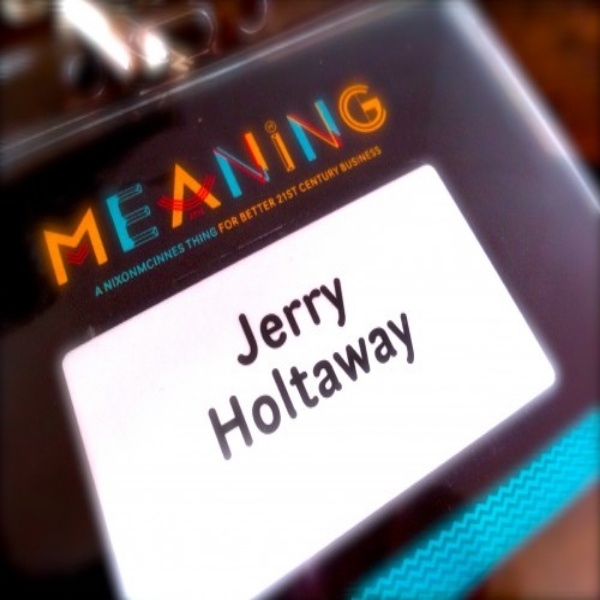Meaning Conference 2012: Seven Key Insights for Businesses That Matter
Meaning Conference 2012: Seven Key Insights for Businesses That Matter

Our Director of Meaningful Insights, Jerry Holtaway, attended “Meaning Conference 2012: Better Business in the 21st Century” in Brighton, UK on October 1.
Here, he shares his most significant takeaways from the day’s session.
“The word ‘business’ is toxic, and business practice in the main is toxic.”
Will McInnes, MD of NixonMcInness and host of the conference, started off the session boldly declaring the trouble business finds itself in as we move into the 21st Century. And while your business may not be clearly “toxic”, it nonetheless depends on people who increasingly view all business (and therefore, by default, yours) in a tainted light.
Our take: How do you rise above that prevailing sentiment? How do you matter to people who are cynical about your intent? How do you make your business stronger today, and better fit for the future? These are the challenges and opportunities of being a business that matters in The Age of Meaning.
“We don’t have to think outside the box, we need to throw out the box.”
In her talk, Caroline Lucas, the UK’s only Green Party MP, asked, “When is enough enough?” Challenging the preoccupation of business with growth at any expense, Caroline referenced several new business models that turn conventional thinking on its head.
Our take: Businesses that matter may not “throw out” their whole box, but they will question many of the smaller boxes within their domain that today produce negative and/or meaningless results for people, society, or the environment. Step-by-step, businesses that matter transform their products, processes, and presence to better align to the meaning people seek in The Age of Meaning.
“One day we may thank the bankers who forced us to have big, bold ideas.”
David Hiatt is the founder of Huit Denim, a business that matters. Founded on a purpose beyond profit, Huit Denim seeks to revive the industry that for decades supported David’s hometown of Cardigan, Wales. On a product level, Huit Denim jeans are the first to be signed by the individual maker, and to have an “online history” of the making of the jeans, to which buyers and subsequent owners can then add photos and comments as they live with their jeans. David believes the forced changes in attitudes, values, and behavior, prompted by the financial crisis, are ultimately good. And while that may be a hard pill to swallow, we think anything that prompts business to become more meaningful to people is a good thing, too.
Our take: Businesses that matter face up to reality, take a deep breath and leap across the meaning gap with confidence.
“Small changes can make a big difference.”
Professor Karen Pine has developed the online “Do Something Different” service, which helps people change attitudes and behaviors through specific actions. Contending that significant changes in attitudes and behaviors aren’t achieved by simply thinking (for example in a typical workshop or training session), Do Something Different sends users email or iPhone app updates urging them to try something new aligned to an attitude or behavior they seek to change. For example, someone who is stressed out may be urged to “take a 15 minute walk”, whereas one who is too domineering may be asked to “stay quiet and listen” during an upcoming meeting.
Our take: Businesses that matter find ways to shift the attitudes and behaviors of the team by encouraging them to make others feel specific feelings. They strive to forge stronger emotional connections through, “Small changes that make a big difference”.
“Happy companies make more money.”
Workplace happiness advocate Alex Kjerulf explained why Danish workers are the world’s happiest. It’s all rooted in a word concept that is known only in Scandinavia: “Arbesdglaede”, which means “workplace happiness”. Alex noted how the word does not equate to the standard industry measure of “job satisfaction”. Happiness is a feeling, whereas satisfaction is how one thinks about one’s work. Nor is workplace happiness a feeling of day-long elation or delight, but rather the feeling of coming home at the end of the day without regretting the day, or rueing going back to work the next day.
Our take: Businesses that matter go beyond metrics, and create meaningful workplaces that evoke feelings of meaningful happiness.
“There is a universal language: it’s called food.”
Pamela Warhurst of Incredible Edibles, wanted to bring the dwellers of her Northern English town of Todmorden back in touch with each other to make life in the town richer and more rewarding. So, she and a number of volunteers have created a variety of vegetable and herb gardens on various bits of disused land along the local canal towpath and have taken to replacing existing “decorative” gardens in front of public buildings and housing units. People passing by are welcome to pick vegetables and herbs for free. She told of a young family walking by a plot one day and letting the children explore and pick from the patch. They returned the next day with a bowl of soup made from the picked ingredients for the woman who allowed her garden to be used by Incredible Edibles.
Our take: Businesses that matter find a new universal language to bring people together. They elevate their business-driven thinking to a more human-=based premise by adopting a purpose beyond profit, which everyone vital to the business’s success can identify with and act upon.
“My job has purpose.”
Four years ago, Luis Suarez of IBM did the unthinkable: he gave up email. He had found his email inbox swelling with messages that were increasingly without consequence, that could have been avoided, and which were often mere power plays by others. He found that, like others, he was spending up to three hours a day simply managing his inbox. He asked, “What if I could use all that time in service to my colleagues and customers?” He took the plunge and hasn’t looked back. He now relies on other more purposeful and direct collaboration tools. The nature of his communication has improved, he shares far more, and offers far more advice to his colleagues and customers.
Our take: Businesses that matter find ways to change policies and procedures to make their interactions more rationally significant and emotionally important to the people vital to their success. They allow, if not encourage, employees like Luis to challenge “business as usual” and to discover better and more meaningful ways to do work that matters.
In summary.
There were several other speakers, all of whom made valid points. In the interest of time, we’ve selected these seven insights for our readers. We invite you to look at the #meaningconf Twitter feed for more about the conference.






